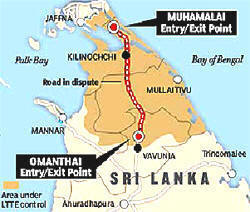Thus, land, sea and air action seem to be in store for the Tamil-speaking North and East, and terrorist bombings seem to be a distinct possibility in the Sinhala-speaking south."It is a frightening prospect," commented Iqbal Athas, the defence correspondent of The Sunday Times. "Will there be multiple bomb blasts in Colombo?" asked an anxious foreign diplomat.
The LTTE has already charged that the Sri Lankan Armed forces are holding "provocative exercises" in Muhamalai, south of Jaffna. Its military spokesman, R Ilanthirayan, said in Geneva that the Army chief, Lt Gen Sarath Fonseka, had briefed commanders of fighting units in Jaffna last Saturday. Government spokesman and websites were, however, silent on the LTTE's allegations.
No eagerness to find meeting ground
The root cause of fears about another round of fighting is that at Geneva, neither the government nor the LTTE showed any eagerness to find middle ground or even a meeting ground on the road issue. Both had made it a prestige issue, which could be settled only by a trial of brute strength on the ground. In a press release issued after the talks, the government said that it would continue to supply all the needs of the Jaffna peninsula by a sea route, till such time the Muhamalai check point on the A9 road could be restored with "adequate protection for the civilians." "When the LTTE was asked to provide safety assurances for the ships, this was refused," the government statement pointed out.
Blaming the LTTE for the closure of the road, it said that it was after the LTTE attacked Muhamalai in August, that the road had to be closed. "The situation still remains insecure with the LTTE mounting attacks," the government said. In its post-talks statement, the LTTE said that closure of the A9 was like erecting a "Berlin wall". The 600,000 Tamil people of the Jaffna peninsula were living in an "open prison" guarded by 60,000 Sri Lankan troops, it said. The LTTE charged that the government had a hidden "military agenda" behind the closure of the road.
When the government delegation argued that the closure of the A9 was not new and that it was closed between 1994 and 2002, the LTTE pointed out that that was a time of war and asked if by closing the road now, the government was intending to push the Tamil people to war, defeat them, and then negotiate with a subjugated people.
The LTTE said that it was ready to fix a date for the next meeting and had asked if the government would open the road before that date. But the government did not respond positively, it pointed out.

